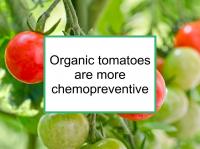A new study has reported that juice from organically-grown tomatoes has higher levels of certain chemopreventive compounds than conventional tomato juice. The study was designed to compare the phenolic and antioxidant profiles of juice produced from organically and conventionally grown tomatoes in Barcelona, Spain.
Primary phenolic compounds in tomatoes include flavonoids (quercetin, and kaempferol) and hydroxycinnamic acids (caffeic acid, chlorogenic acid, ferulic acid and p-coumaric acid), all of which have been reported to have anti-cancer activities.
To conduct the study, the authors compared archived samples from conventional and organic production systems.
Statistically higher levels of phenolic compounds were found in the organic tomato juices (P< 0.05). The higher phenolic levels corresponded to two features of the organic plots: (1) the accumulation of increasing amounts of soil organic matter over time; and (2) reduced fertilization with manure once soils had reached equilibrium levels of organic matter.
Furthermore, phenolic compounds and antioxidant capacity were found to be responsible for the main differences between organic and conventional tomato juices.
The authors conclude that there appear to be genuine differences not previously reported in the bioactive components of organic and conventional tomato juices.
Please see our article on selecting organic foods for more information.
